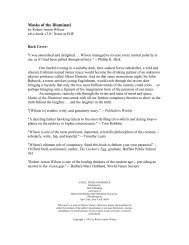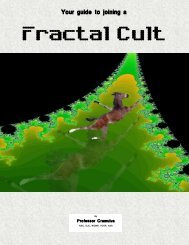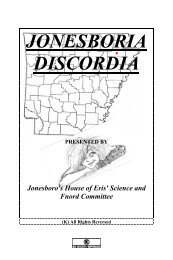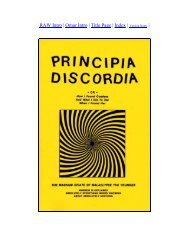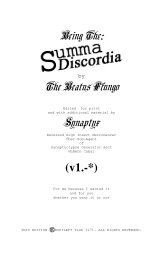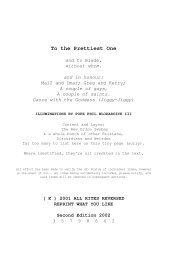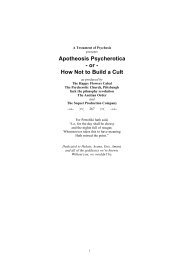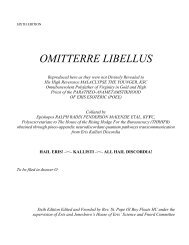Coincidance - Principia Discordia
Coincidance - Principia Discordia
Coincidance - Principia Discordia
Create successful ePaper yourself
Turn your PDF publications into a flip-book with our unique Google optimized e-Paper software.
COINCIDANCE 229<br />
other government spending outside the sacred military toilet. The mob<br />
went mad, especially those who didn't have the foggiest notions of the old<br />
man's philosophy; he has insulted kings, bishops, bankers, all of them, and he<br />
has survived—that is enough to make him a national hero.<br />
The due d'Orleans—"the friend of the people," as he is called—sets about<br />
recruiting the champion of Free Thought into Free Masonry at once.<br />
Voltaire agrees, placidly. M. Franklin is requested to act as Worshipful<br />
Master of the East in the initiation, and is happy to oblige. It is a great<br />
moment when the hoodwink is removed, and the most famous Rationalist<br />
of the age sees that he has been engaged in revolutionary rituals with the<br />
most famous Scientist of the age—the man who hurled lightning bolts at<br />
the Vatican faces the man who tamed the lightning with a key on a kite string.<br />
After the initiation, some say, M. Voltaire and M. Franklin had a banquet<br />
with the Marquis de Condorcet and discussed science and philosophy. The<br />
big gorilla was trying to make it work.<br />
The elusive pony is kiddy porn in the basement.<br />
M. Condorcet, in the course of this symposium, asserted that with the<br />
steady advance of medicine (moving faster everywhere, as the steady<br />
decline of the Inquisition accelerated) a time would come when every disease<br />
would be abolished. M. Franklin agreed, but M. Voltaire said it would take<br />
longer than they realized. M. Condorcet then went further and said that, in<br />
a thousand years, when all governments were staffed by Freemasons and<br />
the last doddering priest had been killed by a brick falling from the last<br />
decaying church, medicine would advance to the point where death itself<br />
would be abolished. M. Franklin agreed again—he had written a bit on that<br />
subject himself, diplomatically leaving out the necessity of abolishing<br />
Christianity before this could be accomplished. M. Voltaire was again<br />
skeptical. Life extension was possible, he agreed, but immortality was a<br />
Christian superstition and unworthy of scientific minds.<br />
M. Condorcet then grew more enthusiastic (they were on their third<br />
bottle of wine by then) and announced that he could foresee major reforms<br />
in the next century alone. M. Franklin listened, spellbound, as M. Condorcet<br />
pictured for them endless caves and labyrinths—a world in which education<br />
was free for all, boys and girls alike, and schools were taught by rational<br />
well-educated men and women, not by narrow-minded priests and nuns. A<br />
world in which insurance companies, some run by private investors and<br />
some by the state, would pay decent premiums to those injured and<br />
disabled, and even to those unemployed by economic recession. A world in<br />
which the state would loan the money for scientific and technological<br />
research not even imaginable today, perhaps even to fly to the moon. A<br />
world in which every city had free public libraries, like the one M. Franklin<br />
had started in Philadelphia, and the state and private investors would offer




